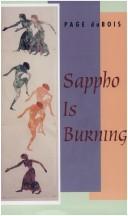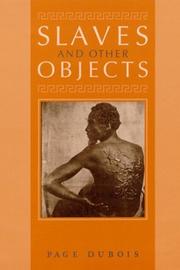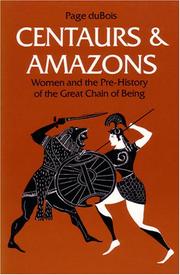| Listing 1 - 10 of 22 | << page >> |
Sort by
|

ISBN: 0226167550 Year: 1995 Publisher: Chicago The University of Chicago Press
Abstract | Keywords | Export | Availability | Bookmark
 Loading...
Loading...Choose an application
- Reference Manager
- EndNote
- RefWorks (Direct export to RefWorks)
Deze studie probeert te achterhalen hoe de figuur en het werk van Sappho in de loop van de geschiedenis werden opgeëist door de "mannelijke" filosofie, geschiedschrijver en literatuurstudie. De auteur wijst op de onmogelijkheid om Sappho in de categorieën van het Westerse denken en de Westerse cultuur te vatten.
Seksualiteit in de literatuur --- Sex in literature --- Sexe dans la littérature --- Greek poetry --- Civilization, Modern --- Women and literature --- Sex in literature. --- Poésie grecque --- Civilisation moderne et contemporaine --- Femmes et littérature --- Sexualité dans la littérature --- History and criticism --- Greek influences --- History. --- Histoire et critique --- Influence grecque --- Histoire --- Sappho --- Criticism and interpretation --- Lost literature --- Women authors --- Theory, etc. --- Greek influences. --- Lesbos Island (Greece) --- In literature. --- Poésie grecque --- Femmes et littérature --- Sexualité dans la littérature --- Poetry --- History --- Sexology --- Thematology --- Philosophy --- Literature --- Foucault, Michel --- Antiquity --- Greece --- Civilization [Modern ] --- Sappho - Criticism and interpretation - History. --- Greek poetry - Women authors - History and criticism - Theory, etc. --- Lost literature - Greece - History and criticism - Theory, etc. --- Sappho of Lesbos --- Sexuality --- Writers --- Book
Book
ISBN: 0859910938 Year: 1982 Publisher: Cambridge Brewer
Abstract | Keywords | Export | Availability | Bookmark
 Loading...
Loading...Choose an application
- Reference Manager
- EndNote
- RefWorks (Direct export to RefWorks)
Epic poetry --- Ekphrasis --- Poésie épique --- History and criticism --- Histoire et critique --- -Ekphrasis --- Description (Rhetoric) --- Descriptive writing --- Rhetoric --- Ecphrasis --- Art in literature --- Heroic poetry --- Poetry --- Poésie épique --- History
Book
ISBN: 9780674728837 0674728831 0674369122 0674369130 Year: 2014 Publisher: Cambridge ; London : Harvard University Press,
Abstract | Keywords | Export | Availability | Bookmark
 Loading...
Loading...Choose an application
- Reference Manager
- EndNote
- RefWorks (Direct export to RefWorks)
Many people worship not just one but many gods. Yet a relentless prejudice against polytheism denies legitimacy to some of the world's oldest and richest religious traditions. In her examination of polytheistic cultures both ancient and contemporary--those of Greece and Rome, the Bible and the Quran, as well as modern India--Page duBois refutes the idea that the worship of multiple gods naturally evolves over time into the "higher" belief in a single deity. In A Million and One Gods, she shows that polytheism has endured intact for millennia even in the West, despite the many hidden ways that monotheistic thought continues to shape Western outlooks. In English usage, the word "polytheism" comes from the seventeenth-century writings of Samuel Purchas. It was pejorative from the beginning--a word to distinguish the belief system of backward peoples from the more theologically advanced religion of Protestant Christians. Today, when monotheistic fundamentalisms too often drive people to commit violent acts, polytheism remains a scandalous presence in societies still oriented according to Jewish, Christian, and Muslim beliefs. Even in the multicultural milieus of twenty-first-century America and Great Britain, polytheism finds itself marginalized. Yet it persists, perhaps because polytheism corresponds to unconscious needs and deeply held values of tolerance, diversity, and equality that are central to civilized societies.
Polytheism --- Polytheism. --- 291.14 --- 141.411 --- God --- Monotheism --- Pantheism --- Religion --- Religions --- Theism --- Indeling der godsdiensten: monotheïsme; polytheïsme --- Polytheïsme --- Polythéisme. --- Polytheismus. --- 141.411 Polytheïsme

ISBN: 0226167577 Year: 1988 Publisher: Chicago (Ill.): University of Chicago press
Abstract | Keywords | Export | Availability | Bookmark
 Loading...
Loading...Choose an application
- Reference Manager
- EndNote
- RefWorks (Direct export to RefWorks)
Classical literature --- Symbolism (Psychology) --- Women --- -Women in art --- Women in literature --- Woman (Christian theology) in literature --- Women in drama --- Women in poetry --- Human females --- Wimmin --- Woman --- Womon --- Womyn --- Females --- Human beings --- Femininity --- Symbolism in psychology --- Psychoanalysis --- Psychology --- Literature, Classical --- Literature --- Literature, Ancient --- Greek literature --- Latin literature --- History --- -Classical literature --- Women in art

ISBN: 0226167879 Year: 2003 Publisher: Chicago (Ill.) University of Chicago Press
Abstract | Keywords | Export | Availability | Bookmark
 Loading...
Loading...Choose an application
- Reference Manager
- EndNote
- RefWorks (Direct export to RefWorks)
Slavery in art. --- Slavery in literature. --- Slaves --- History.
Book
ISBN: 0415902134 Year: 1990 Publisher: London New York Routledge
Abstract | Keywords | Export | Availability | Bookmark
 Loading...
Loading...Choose an application
- Reference Manager
- EndNote
- RefWorks (Direct export to RefWorks)
Torture --- Greece --- History --- Civilization --- To 146 B.C. --- Truth --- Torture - Greece - History. --- Greece - Civilization - To 146 B.C. --- Truth - History.

ISBN: 1479818143 058547978X 9780585479781 9781479818143 0814719465 9780814719466 Year: 2001 Publisher: New York, NY
Abstract | Keywords | Export | Availability | Bookmark
 Loading...
Loading...Choose an application
- Reference Manager
- EndNote
- RefWorks (Direct export to RefWorks)
We've become accustomed to the wisdom of the ancient Greeks being trotted out by conservatives in the name of timeless virtues. At the same time, critics have charged that multiculturalists and their ilk have hopelessly corrupted the study of antiquity itself, and that the teaching of Classics is dead. Trojan Horses is Page duBois's answer to those who have appropriated material from antiquity in the service of a conservative political agendaamong them, Camille Paglia, Allan Bloom, and William Bennett. She challenges cultural conservatives' appeal to the authority of the classics by arguing that their presentation of ancient Greece is simplistic, ahistorical, and irreparably distorted by their politics. As well as constructing a devastating critique of these pundits, Trojan Horses seeks to present a more complex and more accurate view of ancient Greek politics, sex, and religion, with a Classics primer. She eloquently recounts the tales of Daedalus and Artemis, for example, conveying their complexity and passion, while also unearthing actions and beliefs that do not square so easily with today's "family values." As duBois writes, "Like Bennett, I think we should study the past, but not to find nuggets of eternal wisdom. Rather we can comprehend in our history a fuller range of human possibilities, of beginnings, of error, and of difference." In these fleet chapters, duBois offers readers a view of the ancient Greeks that is more nuanced, more subtle, more layered and in every way more historical than the portrait other writers, of whatever stripe, want to popularize and see displayed in our classrooms. Sharp, timely, and engaging, Trojan Horses portrays the richness of ancient Greek culture while riding in to rescue the Greeks from the new barbarians.
Classical philology --- Civilization, Classical --- Classical literature --- Education --- Education, Humanistic --- Conservatism --- Classical civilization --- Civilization, Ancient --- Classicism --- Philology, Classical --- Classical antiquities --- Greek language --- Greek literature --- Greek philology --- Humanism --- Latin language --- Latin literature --- Latin philology --- Study and teaching --- History and criticism --- Theory, etc. --- Political aspects --- Conservatisme --- Éducation humaniste --- Éducation --- Litterature ancienne --- Civilisation ancienne --- Philologie ancienne --- Children --- Education, Primitive --- Education of children --- Human resource development --- Instruction --- Pedagogy --- Schooling --- Students --- Youth --- Civilization --- Learning and scholarship --- Mental discipline --- Schools --- Teaching --- Training --- Aspect politique --- Histoire et critique --- Theorie, etc. --- Étude et enseignement

ISBN: 1282940228 9786612940224 0472021540 9780472021543 9780472100217 0472081535 9780472081530 0472100211 Year: 1991 Publisher: Ann Arbor University of Michigan Press
Abstract | Keywords | Export | Availability | Bookmark
 Loading...
Loading...Choose an application
- Reference Manager
- EndNote
- RefWorks (Direct export to RefWorks)
Traces the development of the Greek hierarchical view of life that continues to permeate Western society
Chain of being (Philosophy) --- Centaurs. --- Amazons. --- Women --- Great chain of being (Philosophy) --- Continuity --- Cosmology --- Creation --- Ontology --- Philosophy --- Mythology, Classical --- Women soldiers --- History. --- Greece --- Civilization --- Civilization.
Book
ISBN: 0755695194 0857726617 9780857726612 0857739859 9780857739858 1784533602 9781784533601 9781784533618 1784533610 Year: 2015 Publisher: London : I.B. Tauris,
Abstract | Keywords | Export | Availability | Bookmark
 Loading...
Loading...Choose an application
- Reference Manager
- EndNote
- RefWorks (Direct export to RefWorks)
"Sappho has been constructed as many things: proto-feminist, lesbian icon and even - by the Victorians - chaste headmistress of a girls' finishing school. Yet ironically, as Page DuBois shows, the historical poet herself remains elusive. We know that Sappho's contemporary Alcaeus described her as 'violet, pure, honey-smiling Sappho'; and that the rhetorician and philosopher Maximus of Tyre saw her, perhaps less enthusiastically, as 'small and dark'. We also know that her 7th/6th century BCE island of Lesbos was riven by tyrannical and aristocratic factionalism and that she was probably exiled to Sicily. Much of the rest is speculative. DuBois suggests that the value of Sappho lies elsewhere: in her remarkable verse, and in the poet's reception - one of the richest of any figure from antiquity. Offering nuanced readings of the poems, written in an archaic Aeolic dialect, DuBois skillfully draws out their sharp images and rhythmic melody. She further discusses the exciting discovery of a new verse fragment in 2004, and the ways in which Sappho influenced Catullus, Horace and Ovid, as well as later writers and painters."--Bloomsbury Publishing.
Poets, Greek. --- Literary studies: classical, early & medieval. --- Sappho --- Criticism and interpretation. --- Greek poets --- Sapfo --- Sapfo van Lesbos --- Sappho van Lesbos --- Sapho --- Safo --- Sapʻo --- Saffo --- Sapphus --- Сафо --- سيفو --- Safona --- Σαπφῶ --- Ψάπφω --- Psappho
Book
ISBN: 0674035585 0674053761 Year: 2010 Publisher: Harvard University Press
Abstract | Keywords | Export | Availability | Bookmark
 Loading...
Loading...Choose an application
- Reference Manager
- EndNote
- RefWorks (Direct export to RefWorks)
| Listing 1 - 10 of 22 | << page >> |
Sort by
|

 Search
Search Feedback
Feedback About UniCat
About UniCat  Help
Help News
News